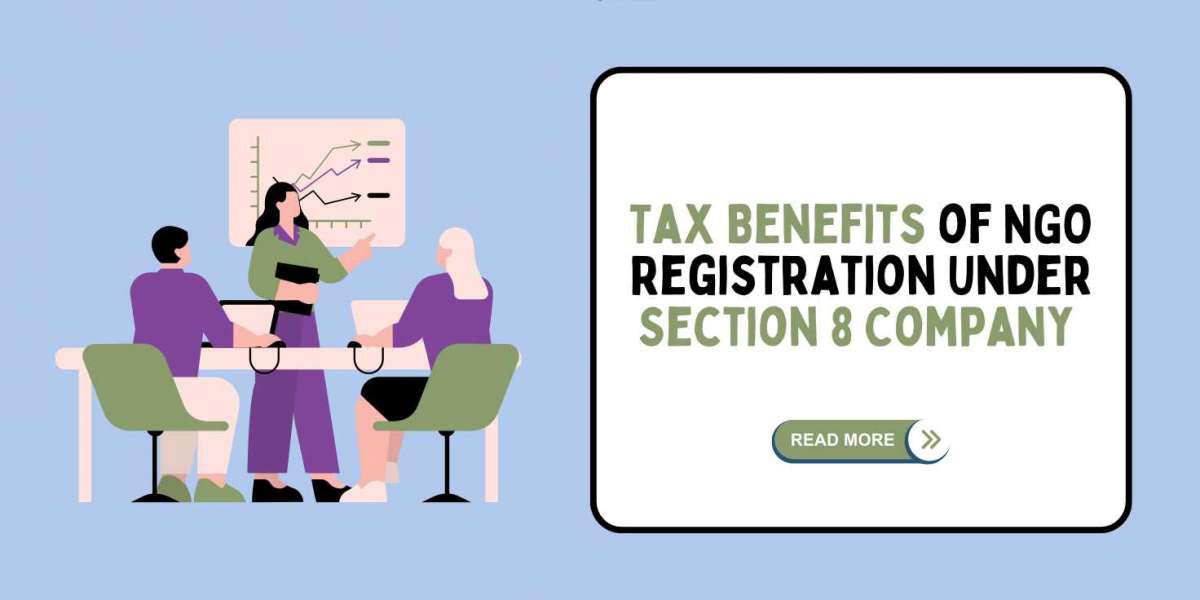Starting a Non-Governmental Organization (NGO) in India is a great way to contribute to society while also enjoying several tax benefits. If you register your NGO as a Section 8 Company, you can take advantage of various tax exemptions that help in reducing financial burdens. This article will cover the tax benefits of NGO Registration under a Section 8 Company, the registration process, and why this structure is beneficial for social entrepreneurs.
What is a Section 8 Company?
A Section 8 Company is an NGO formed under the Companies Act, 2013. It promotes social welfare, charity, education, science, art, and other nonprofit activities. Unlike private or public limited companies, a Section 8 Company does not distribute profits among its members. Instead, the profits are reinvested to achieve the organization's objectives.
Tax Benefits of Section 8 Company Registration
Income Tax Exemption Under Section 12A
Once the Registration of a Non-Governmental Organization Section 8 Company is completed, it can apply for exemption under Section 12A of the Income Tax Act. This allows the NGO to be exempt from paying income tax on surplus funds, provided the funds are utilized for charitable purposes.
80G Certification for Donors
A Section 8 Company can also apply for an 80G certificate. This certificate benefits donors as they can claim tax deductions of up to 50% on their donations. This encourages individuals and corporations to contribute more towards social causes.
GST Exemption
In many cases, NGOs registered as Section 8 Companies can claim exemptions from Goods and Services Tax (GST) for activities related to education, health, and charitable services. However, this depends on the nature of their work and compliance with GST rules.
Lower Tax Rates Under Section 115BBC
A Section 8 Company is protected from the high tax rates imposed on anonymous donations. If proper documentation is maintained for donations, the NGO is taxed at standard rates instead of the higher 30% tax rate applied to unverified donations.
No Minimum Capital Requirement
Unlike other types of companies, Section 8 Companies do not require a minimum capital investment. This ensures that funds are utilized effectively for nonprofit activities instead of being locked in as capital investments.
Exemption from Stamp Duty
Section 8 Company registration also offers an exemption from stamp duty during the incorporation process. This helps in reducing the overall cost of setting up the NGO.
Benefits Under CSR (Corporate Social Responsibility)
Companies that need to fulfill their CSR obligations often prefer donating to Section 8 Companies. This helps NGOs in getting more financial support while also benefiting corporate donors through tax deductions.
How to Register an NGO in India as a Section 8 Company
The Section 8 Company registration process involves multiple steps. Here’s a step-by-step guide:
Step 1: Obtain a Digital Signature Certificate (DSC)
The first step in the Section 8 Company registration process is obtaining a Digital Signature Certificate (DSC) for the directors. DSC is required to file electronic forms with the Ministry of Corporate Affairs (MCA).
Step 2: Apply for Director Identification Number (DIN)
Every director of the Section 8 Company must have a unique DIN issued by the MCA. This ensures transparency and accountability in company management.
Step 3: Name Approval Through RUN (Reserve Unique Name) Application
A Section 8 Company must have a unique name that reflects its objectives. The proposed name should be submitted through the MCA’s RUN portal for approval. The name should include words like "Foundation," "Society," "Association," or "Organization" to indicate its nonprofit nature.
Step 4: Draft Memorandum of Association (MOA) and Articles of Association (AOA)
MOA and AOA outline the mission, objectives, and operational rules of the Section 8 Company. These documents must be carefully drafted as they play a crucial role in registration approval.
Step 5: Apply for Section 8 Company Registration
Once the name is approved, an application for registration of a non-governmental organization Section 8 Company is filed with the Registrar of Companies (ROC). This includes submitting forms like INC-12, along with MOA, AOA, and other required documents.
Step 6: Receive License and Certificate of Incorporation
If the application is approved, the ROC issues a Section 8 Company license. The company is then officially registered, and a Certificate of Incorporation is provided.
Step 7: Apply for PAN, TAN, and 12A/80G Certification
After registration, the NGO must apply for:
- PAN (Permanent Account Number)
- TAN (Tax Deduction and Collection Account Number)
- 12A and 80G certification for tax exemptions and donor benefits.
Step 8: Open a Bank Account and Begin Operations
Finally, a bank account is opened in the name of the NGO, and operations can officially begin.
Why Choose Section 8 Company Over Other NGO Structures?
There are different ways to register an NGO in India, including forming a Trust or a Society. However, a Section 8 Company has several advantages:
- Better Legal Recognition – A Section 8 Company is regulated by the MCA, making it more credible than Trusts and Societies.
- More Fundraising Opportunities – Donors and corporate sponsors prefer Section 8 Companies due to their structured operations.
- Easier Compliance Process – While there are annual compliance requirements, the structure ensures transparency and ease of operation.
- Limited Liability – Members have limited liability, reducing financial risks.
Conclusion
Section 8 Company Registration is the best option for those who want to start an NGO and enjoy tax benefits. From income tax exemptions to donor benefits under 80G, the tax advantages make it easier to manage finances and focus on social impact. Moreover, the Section 8 company registration process is straightforward and ensures greater credibility for the organization. If you are planning to establish an NGO in India, opting for a Section 8 Company is a smart choice for long-term sustainability and tax savings.
FAQs
- Is GST registration mandatory for a Section 8 Company?
No, GST registration is not mandatory for all Section 8 Companies. However, if the annual turnover exceeds the GST threshold limit or the NGO provides taxable services, GST registration may be required.
- Can foreign donations be received under a Section 8 Company?
Yes, a Section 8 Company can receive foreign donations, but it must register under the Foreign Contribution (Regulation) Act (FCRA) to legally accept foreign funds.
- How long does it take to complete the Section 8 Company registration process?
The registration process typically takes 15-30 days, depending on the approval timeline of the Ministry of Corporate Affairs and the correctness of the submitted documents.







